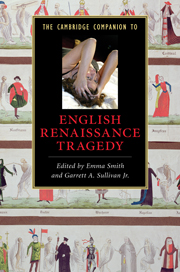Book contents
- Frontmatter
- Part 1 Themes
- 1 English Renaissance tragedy: theories and antecedents
- 2 Tragedy, family and household
- 3 Tragedy and the nation state
- 4 Tragedy and religion
- 5 Tragedy and revenge
- 6 Tragic subjectivities
- 7 Tragic forms
- 8 Tragedy and performance
- 9 Renaissance tragedy on film: defying mainstream Shakespeare
- 10 Shakespeare and early modern tragedy
- Part II Readings
- Index
3 - Tragedy and the nation state
from Part 1 - Themes
Published online by Cambridge University Press: 28 November 2010
- Frontmatter
- Part 1 Themes
- 1 English Renaissance tragedy: theories and antecedents
- 2 Tragedy, family and household
- 3 Tragedy and the nation state
- 4 Tragedy and religion
- 5 Tragedy and revenge
- 6 Tragic subjectivities
- 7 Tragic forms
- 8 Tragedy and performance
- 9 Renaissance tragedy on film: defying mainstream Shakespeare
- 10 Shakespeare and early modern tragedy
- Part II Readings
- Index
Summary
The relationship between English tragedy and the nation was there from the start. The 'first real English tragedy' was Gorboduc: Or Ferrex and Porrex (1560-1), a play performed at the Inner Temple as part of the post-Christmas revels in 1561. Gorboduc was explicitly concerned with the fate of England and showed in painstaking detail what was likely to happen if the monarch failed to behave in the best interests of his or her subjects. In doing so the play is 'as much the tragedy of a commonwealth as of a king' (p. xvii), focusing on the fate of the nation from above and below, both its rulers and their subjects.
The play uses material from ancient British history, derived from Geoffrey of Monmouth's twelfth-century work of history and legend, The History of the Kings of Britain. Geoffrey's History tells the story of Britain from its foundation by Brutus, descendant of Aeneas, to the banishment of the Britons to 'Little Britain' (Brittany) with the Anglo-Saxon invasion. British history is essentially tragic: there is a spectacular highpoint when the British Empire rivals Rome after the conquests of their greatest king, Arthur, but a series of self-destructive betrayals and foolish political alliances and manoeuvres destroy the security and power of the kingdom. Whenever the Britons are about to enjoy peace and prosperity, they overreach themselves and are punished by God. When the last British king, Cadwallader, falls ill, the result is civil war followed by famine and plague.
- Type
- Chapter
- Information
- The Cambridge Companion to English Renaissance Tragedy , pp. 30 - 43Publisher: Cambridge University PressPrint publication year: 2010
- 2
- Cited by

